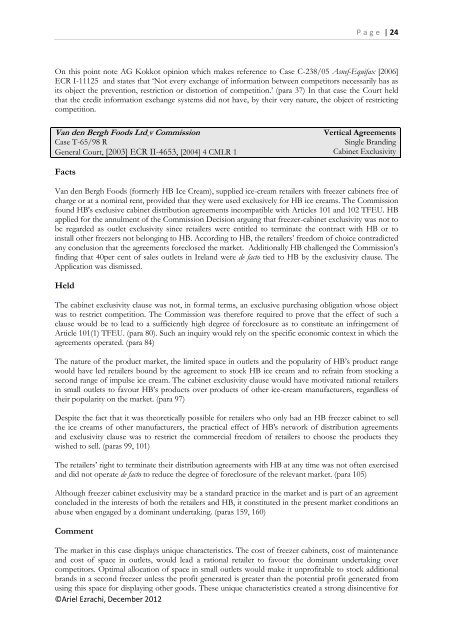EU Competition Law and Policy - compal
EU Competition Law and Policy - compal
EU Competition Law and Policy - compal
Create successful ePaper yourself
Turn your PDF publications into a flip-book with our unique Google optimized e-Paper software.
P a g e | 24<br />
On this point note AG Kokkot opinion which makes reference to Case C-238/05 Asnef-Equifax [2006]<br />
ECR I-11125 <strong>and</strong> states that ‘Not every exchange of information between competitors necessarily has as<br />
its object the prevention, restriction or distortion of competition.’ (para 37) In that case the Court held<br />
that the credit information exchange systems did not have, by their very nature, the object of restricting<br />
competition.<br />
Van den Bergh Foods Ltd v Commission<br />
Case T-65/98 R<br />
General Court, [2003] ECR II-4653, [2004] 4 CMLR 1<br />
Facts<br />
Vertical Agreements<br />
Single Br<strong>and</strong>ing<br />
Cabinet Exclusivity<br />
Van den Bergh Foods (formerly HB Ice Cream), supplied ice-cream retailers with freezer cabinets free of<br />
charge or at a nominal rent, provided that they were used exclusively for HB ice creams. The Commission<br />
found HB's exclusive cabinet distribution agreements incompatible with Articles 101 <strong>and</strong> 102 TF<strong>EU</strong>. HB<br />
applied for the annulment of the Commission Decision arguing that freezer-cabinet exclusivity was not to<br />
be regarded as outlet exclusivity since retailers were entitled to terminate the contract with HB or to<br />
install other freezers not belonging to HB. According to HB, the retailers’ freedom of choice contradicted<br />
any conclusion that the agreements foreclosed the market. Additionally HB challenged the Commission's<br />
finding that 40per cent of sales outlets in Irel<strong>and</strong> were de facto tied to HB by the exclusivity clause. The<br />
Application was dismissed.<br />
Held<br />
The cabinet exclusivity clause was not, in formal terms, an exclusive purchasing obligation whose object<br />
was to restrict competition. The Commission was therefore required to prove that the effect of such a<br />
clause would be to lead to a sufficiently high degree of foreclosure as to constitute an infringement of<br />
Article 101(1) TF<strong>EU</strong>. (para 80). Such an inquiry would rely on the specific economic context in which the<br />
agreements operated. (para 84)<br />
The nature of the product market, the limited space in outlets <strong>and</strong> the popularity of HB’s product range<br />
would have led retailers bound by the agreement to stock HB ice cream <strong>and</strong> to refrain from stocking a<br />
second range of impulse ice cream. The cabinet exclusivity clause would have motivated rational retailers<br />
in small outlets to favour HB’s products over products of other ice-cream manufacturers, regardless of<br />
their popularity on the market. (para 97)<br />
Despite the fact that it was theoretically possible for retailers who only had an HB freezer cabinet to sell<br />
the ice creams of other manufacturers, the practical effect of HB's network of distribution agreements<br />
<strong>and</strong> exclusivity clause was to restrict the commercial freedom of retailers to choose the products they<br />
wished to sell. (paras 99, 101)<br />
The retailers’ right to terminate their distribution agreements with HB at any time was not often exercised<br />
<strong>and</strong> did not operate de facto to reduce the degree of foreclosure of the relevant market. (para 105)<br />
Although freezer cabinet exclusivity may be a st<strong>and</strong>ard practice in the market <strong>and</strong> is part of an agreement<br />
concluded in the interests of both the retailers <strong>and</strong> HB, it constituted in the present market conditions an<br />
abuse when engaged by a dominant undertaking. (paras 159, 160)<br />
Comment<br />
The market in this case displays unique characteristics. The cost of freezer cabinets, cost of maintenance<br />
<strong>and</strong> cost of space in outlets, would lead a rational retailer to favour the dominant undertaking over<br />
competitors. Optimal allocation of space in small outlets would make it unprofitable to stock additional<br />
br<strong>and</strong>s in a second freezer unless the profit generated is greater than the potential profit generated from<br />
using this space for displaying other goods. These unique characteristics created a strong disincentive for<br />
©Ariel Ezrachi, December 2012



